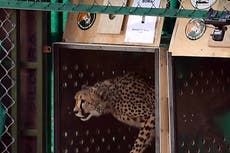India loses another cheetah marking ninth wildcat death in just 11 months of ambitious translocation project
It is likely the cheetah may have died earlier but was only found on Wednesday

One more cheetah meant for an ambitious transcontinental relocation project of the animal taking place in India has been found dead, taking the total number of casualties to nine in a span of just 11 months.
India has now lost 30 per cent of the cheetahs it had borrowed from South Africa and Namibia in a bid to reintroduce the wild cat population on its soil.
The experiment that is taking place in India’s Kuno national park has suffered a series of major setbacks that include cheetahs contracting bacterial infection as well as communication breakdown with experts.
One of the female cheetahs, Dhatri – renamed from Tbilisi – was found dead in the park on Wednesday morning, officials said in a statement. The cause of Dhatri’s death has not been determined yet and an autopsy is being carried out to find the reason, it said.
It is likely the cheetah may have died earlier, but was only found on Wednesday, The Independent has learnt.
Dhatri was among one of the two free-range cheetahs wildlife officials in India were trying to locate in the park since last month after the alarming deaths that had occurred in recent weeks, which experts said were caused due to the bacterial infection septicemia on the wet necks of the wildcats in the wake of excessive monsoon in the central state of Madhya Pradesh where the park is located.
Another cheetah, Nirva, is yet to be found, tracked and darted by authorities looking to check for signs of any skin infection on her neck.
Both the female cheetahs were shy and avoided human interaction, adding to the difficulties of locating them, officials told The Independent, but added that park officials also had enough time to work with them to find a solution.
Indian authorities have blamed the deaths of the cheetahs on natural causes and ruled out poor monitoring in their latest remarks submitted to the country’s apex Supreme Court.
India is now left with 15 cheetahs, including one female cub born in March in the country, and has lost six of the borrowed cheetahs to bacterial infection, maggots, renal failure, injuries and heat.
This is also the third cheetah death in less than a month.
The project, personally inaugurated with pomp and fervour by prime minister Narendra Modi in September last year, has garnered flak for the “avoidable” deaths before the first year anniversary of the project.
The Independent had also learned that there had been a recent information ban and communication breakdown with African experts who readied and transported the cheetahs.
South African experts have already flagged that the project’s existing team has “little or no scientific training” and Indian authorities are ignoring their opinions.
Critical details on injured cheetahs, one of which succumbed to his infection, have not been relayed to the African experts who are part of the steering committee handling the project.
The project aims to create the first stable population of cheetahs in India ever since they were hunted to extinction in the 1950s and is also critical to reviving a cheetah population that is otherwise on the decline globally.
Join our commenting forum
Join thought-provoking conversations, follow other Independent readers and see their replies
Comments




Bookmark popover
Removed from bookmarks